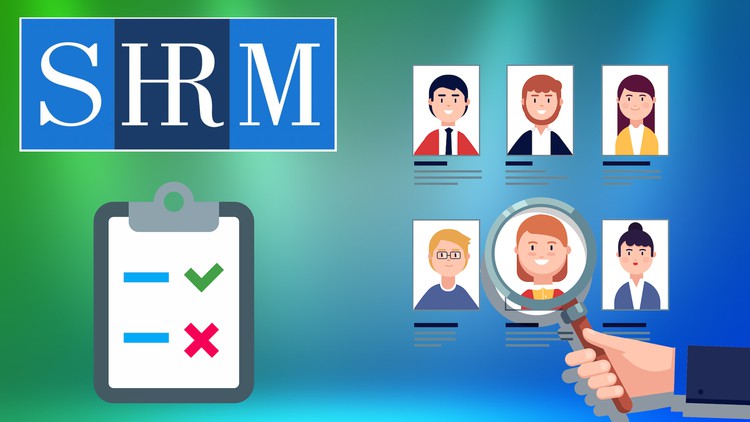
10+ Hours Course and Four Practice Tests to Master the Fundamentals of Talent Management and Ace the SHRM Exam
What you will learn
The importance of strategic and workforce planning in talent management.
The key concepts, models, theories and legal considerations in strategic and workforce planning.
The role of technology in strategic and workforce planning and how to measure and evaluate the results.
The essential elements of talent acquisition, from the planning phase to the hiring phase.
The legal considerations and common practices in talent acquisition and how to measure and evaluate the results.
The three phases of onboarding and the importance of employee engagement.
The theories, models and legal considerations in onboarding and employee engagement and how to measure and evaluate the results.
The key principles of performance management and the role of performance coaching and constructive discipline.
The technologies, common practices, and methods to measure the effectiveness of performance management.
The concept of employee value proposition and the theories, models and legal considerations that support it.
The role of technology in employee value proposition and how to measure the results.
The importance of learning and development and the common practices, legal considerations, and methods to measure and evaluate the results.
The key concepts and best practices of succession planning, upskilling and reskilling.
The role of technology in succession planning, upskilling and reskilling and how to measure and evaluate the results.
The key considerations and best practices in internal and external transitions and how to measure the results.
Description
The SHRM Essential Guide to Talent Management Preparation for the SHRM Exam is an in-depth course designed for HR professionals and aspiring HR professionals who are looking to take the SHRM certification exam. This comprehensive course covers all the essential topics related to talent management, which is a critical component of the SHRM exam. This course will provide you with a comprehensive understanding of the strategies and techniques that are required to effectively manage an organization’s talent.
In Section 1, we will delve into the importance of strategic and workforce planning. You will learn about the different planning models, theories, and philosophies that are used in HR. We will also cover the legal considerations that come into play when developing a strategic and workforce plan, as well as the role that technology plays in this process.
Section 2 is all about talent acquisition, and it will explore the various methods and techniques used to attract and retain top talent. You will learn about the legal considerations in talent acquisition, the role of technology, and common practices in the field. This section will also provide you with an understanding of the different talent-acquisition models, theories, and philosophies.
In Section 3, we will examine the importance of onboarding and employee engagement. This Section will explore the three phases of onboarding and provide you with an understanding of the different models, theories, and philosophies that support this process. You will also learn about the legal considerations in onboarding and employee engagement, as well as the role that technology plays in this process.
Section 4 covers the critical aspect of performance management. You will learn about the different terms, models, and theories that support performance management, as well as the legal considerations and the role of technology in this process. This section will provide you with a comprehensive understanding of performance coaching and constructive discipline, and provide you with the resources you need to effectively manage employee performance.
Section 5 focuses on the employee value proposition, and explores the various methods used to retain top talent. You will learn about the different philosophies, models, and theories that support the employee value proposition, as well as the legal considerations that come into play. This section will also provide you with an understanding of the role of technology in this process and provide you with resources to help you effectively evaluate the employee value proposition.
In Section 6, we will delve into learning and development, and explore the different methods and techniques used to develop employee skills. You will learn about the legal considerations, the role of technology, and the common practices used in learning and development. This section will provide you with the resources you need to evaluate the effectiveness of your learning and development efforts.
Section 7 focuses on succession planning, up-skilling, and re-skilling, and provides you with an understanding of the strategies and techniques used to develop future leaders. You will learn about the different philosophies, models, and theories that support this process, as well as the legal considerations and the role of technology. This section will also provide you with resources to help you evaluate the effectiveness of your succession planning, up-skilling, and re-skilling programs.
Finally, in Section 8, we will examine the importance of employee transitions and provide you with an understanding of the different methods used to manage internal and external transitions. You will learn about the legal considerations and the role of technology in this process, as well as the best practices used in employee transitions. This section will provide you with resources to help you evaluate the effectiveness of your employee transitions.
Content